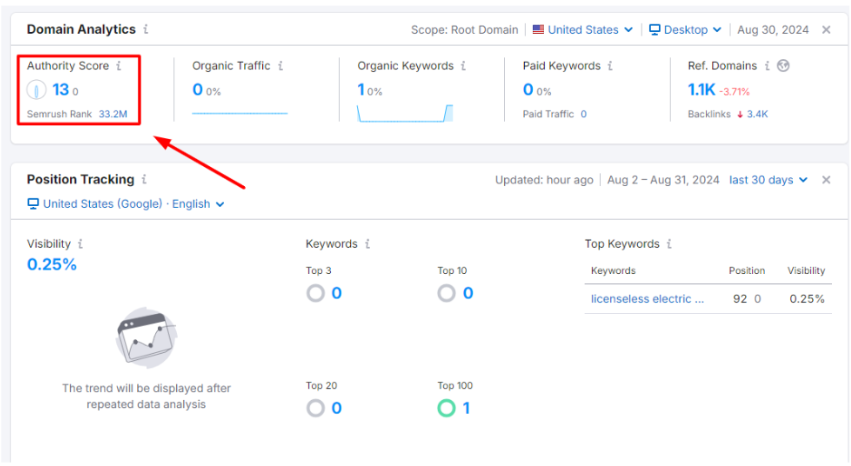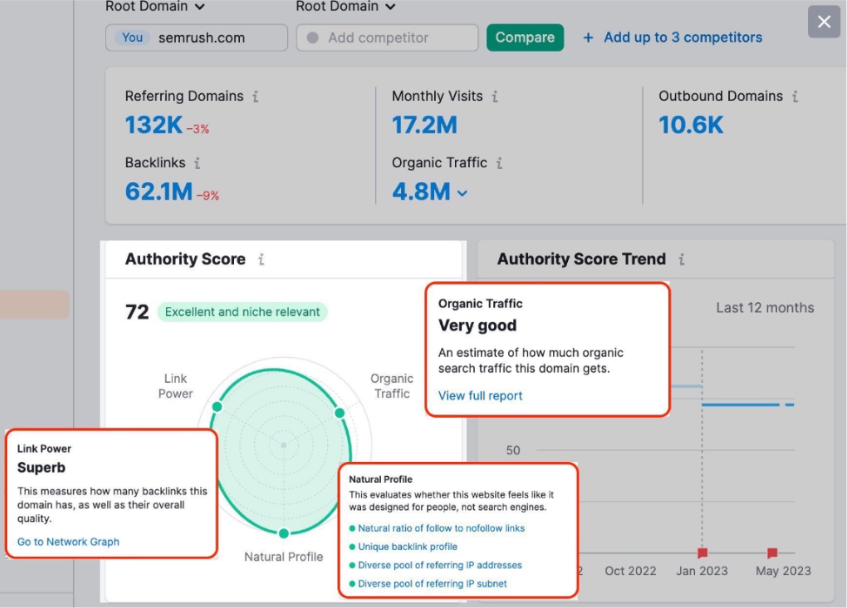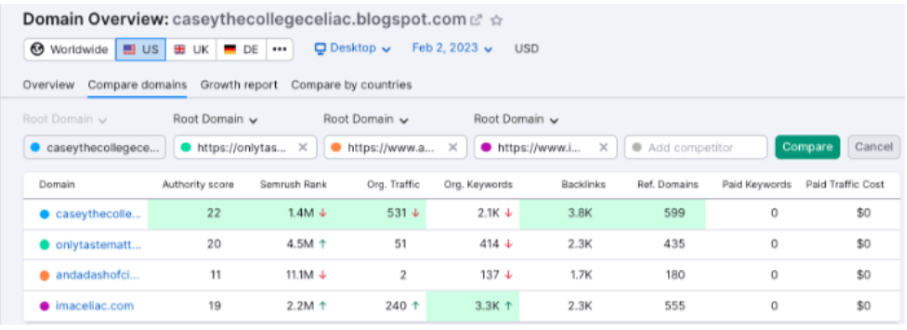Semrush is undoubtedly the talk of the town in the SEO industry. Along with the plethora of advanced features and tools, it offers a crucial parameter – the Authority Score.
Authority Score stands out as a key metric for evaluating online presence. As websites rival for visibility in search results, understanding and utilizing this score has become increasingly important.
In this guide, I will share everything you need to know about Semrush Authority Score, how it is measured, and what scores are generally considered good for a website.
Authority Score On Semrush
The Semrush Authority Score is a sophisticated measure designed to assess a website’s overall quality and SEO effectiveness. It’s not just a simple number but a reflection of a site’s digital footprint and influence.

To calculate this score, Semrush employs a multi-faceted approach:
- Backlink Analysis: This examines both the quantity and quality of inbound links.
- Organic Search Performance: It evaluates the volume and consistency of organic traffic.
- Trustworthiness Indicators: The system checks for signs of artificial link manipulation or spam.
Using advanced algorithms, Semrush processes these elements to generate a score ranging from 0 to 100. A higher score indicates greater domain authority and potential search engine influence.
What Is A Good Authority Score On Semrush?
Defining a “good” Authority Score isn’t a one-size-fits-all proposition. However, we can outline some general guidelines to help you interpret your score:

- 0-20: Developing presence
- 21-40: Building authority
- 41-60: Established influence
- 61-80: Strong authority
- 81-100: Dominant force
These ranges can shift dramatically across different sectors. A score of 50 might be impressive for a local bakery but underwhelming for a national news outlet.
The most effective way to gauge your score is by comparing it to direct competitors in your niche. If you’re outscoring similar sites, you’re on the right track. If you’re lagging behind, it signals room for improvement.
If you want to know your website’s authority score, get started with our exclusive Semrush free trial.
How To Interpret Your Authority Score?
Decoding your Authority Score provides insights into your website’s current standing and potential for growth. Here’s a breakdown of what different score ranges typically signify:

Scores Between 0 to 20: An Authority Score in this range often indicates a new or relatively unknown website. It might have limited backlinks and minimal organic traffic. While it may seem discouraging, remember that every successful site started here. This stage offers enormous potential for growth and improvement.
Score Ranging between 21 to 40: Websites in this bracket are building momentum. They’re likely attracting some organic traffic and have begun accumulating quality backlinks. Focus on consistently producing valuable content and expanding your network to climb higher.
Authority Score between 41 to 60: At this level, your site has gained noticeable traction. You’re probably seeing steady traffic and have a respectable backlink profile. To advance further, refine your content strategy and seek opportunities for high-quality link acquisition.
Strong authority (61-80): Sites scoring in this range are significant players in their field. They typically boast robust traffic figures and a diverse, high-quality backlink portfolio. At this stage, the focus shifts to maintaining your position while seeking opportunities to further solidify your authority.
Scores above 80: Reaching this tier puts you among the elite. Your site is likely considered a go-to resource in its niche, with substantial organic traffic and an impressive link profile. The challenge now is to stay ahead of the curve and continue innovating.
Along with the Authority Score, Semrush illustrates other features. But they can differ on each plan, so make sure to compare Semrush pricing plans before signing up for one.
Factors Affecting Semrush Authority Score
Several key elements contribute to your Authority Score:
- Link Profile: The diversity and quality of your backlinks play a crucial role. Links from respectable, pertinent websites are given more weight than those from irrelevant or poor-quality websites.
- Site History: Established domains often have an edge, as they’ve had more time to build trust and authority.
- Organic Search Performance: Consistent, high-quality organic traffic is a positive indicator of your score.
- User Engagement: Metrics like bounce rate, time on site, and pages per session can influence your authority.
- Content Quality: Well-crafted, original content tends to attract more backlinks and engaged visitors, boosting your score.
Strategies To Improve Your Semrush Authority Score
If you are a regular user of Semrush, you can implement these strategies to your SEO checklists to improve your authority score:
Diversify your backlink sources: Aim for a varied link profile from respected sites in your industry. Engage in guest blogging, create shareable infographics, or collaborate with influencers to expand your reach.
Prioritize content excellence: Develop comprehensive, unique content that addresses your audience’s pain points. Quality content naturally attracts backlinks and increases organic traffic.
Optimize technical SEO: Ensure your site structure, meta tags, and internal linking are optimized. A well-organized site helps search engines understand and value your content more effectively.
Enhance user experience: Focus on improving site speed, mobile responsiveness, and navigation. A positive user experience leads to better engagement metrics, indirectly boosting your Authority Score.
Conclusion: Authority Scores Ranging Between 40 To 60 Are Considered Good on Semrush
The Semrush Authority Score is a valuable barometer for your website’s digital influence. You are on the right path if your site’s authority score ranges between 40 to 60 on Semrush.
Improving your Authority Score is a slow yet constant process. It demands ongoing effort to create stellar content, cultivate a healthy link profile, and enhance overall site performance. By monitoring your score and adjusting your approach accordingly, you’ll see numeric improvements and tangible benefits in search visibility and organic traffic.
Remember, the Authority Score is just one piece of the SEO puzzle. Use it as a guide, but always consider it alongside other crucial metrics for a holistic approach to your digital marketing efforts.